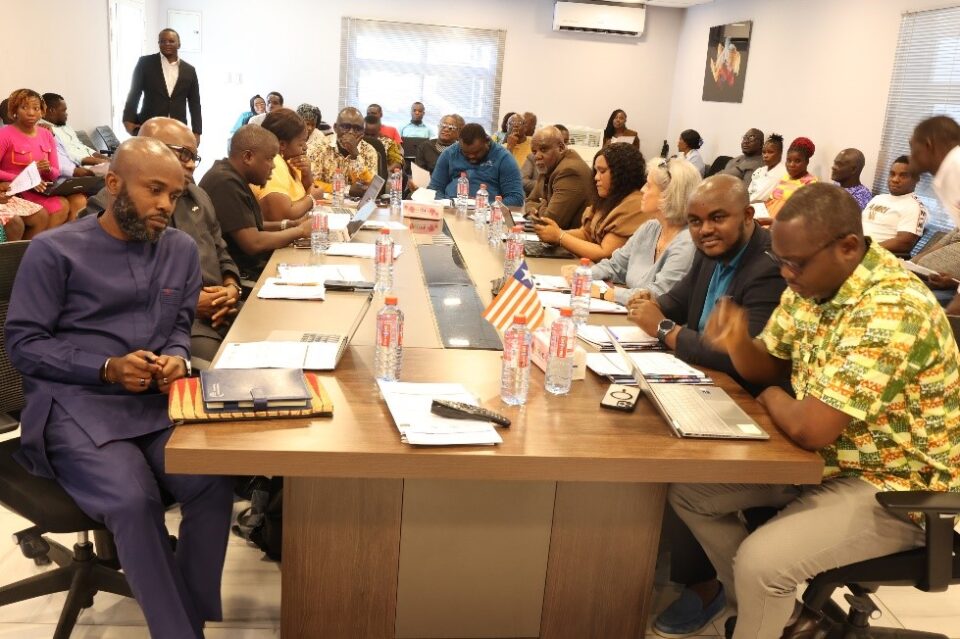As EU Funded Communities For Fisheries Project Round Table Discussion Starts
Freeport- The Director General of the National Fisheries and Aquaculture Authority says International Partners’ huge commitment to the Liberian Fisheries sector has resulted in tremendous transformation across fishing communities, says a NaFAA press release..
Madam Emma Metieh Glassco acknowledged that international partners’ commitment to the Liberian fisheries sector has transformed it from a dormant state to a more functional sector.
Speaking through a proxy Wednesday, June 19, 2024, at the start of a two-day round table discussion under a European Union-funded Communities for Fisheries project implemented by the Environmental Justice Foundation (EJF) on the Voluntary Guidelines on Responsible Governance of Tenure of Land, Fisheries, and Forests in the Context of National Food Security (VGGT), and the voluntary guidelines for securing sustainable small-scale fisheries in the context of food security and poverty eradication (SSF Guidelines), madam Glassco noted that the Liberian Fisheries Authority has positively engaged with the local fishing communities across the nine coastal counties.
The Director of Human Resources and Chief of Staff in the Office of Director General Glassco, Vannie Siekula said NaFAA with the commitment from international Partners has strengthened local fisheries management. Director Siekula said with support from the European Union, Liberian fishing communities have been strengthened through the establishment of the Core Management Associations.
Director Siekula commanded the European Union on behalf of the Liberian government through the National Fisheries and Aquaculture Authority, NaFAA for their support to the Liberian Fisheries sector.
At the same time, the Food and Agriculture Organization of the United Nations Assistant Representative for Program Octavius T. Quarbo has outlined the tremendous efforts the UN organization has made to foster growth and development across several sectors including the fisheries.
Mr. Quarbo mentioned that FAO has supported efforts under the Voluntary Guidelines on the Responsible Governance of Tenure of Land and Fisheries, working with multiple actor platforms on responsible agriculture and investment, and land Governance. He revealed that some of those efforts fed into support from the government of Liberia and different civil society stakeholders which led to the passage of the land rights act.
The Food and Agriculture Organization of the United Nations Assistant Representative for Program furthered that following the passage of the Land Rights Act, the United Nations Organization was the singular contributor in the areas of finance and technical assistance for the hosting of the first land conference in 2022.
Moreover, he said with funding from the Japanese Government, FAO has managed to lend support to small-scale actors in their different works across coastal counties in Liberia.
Giving an overview of the European Union-funded Community for Fisheries Project at the start of the roundtable meeting the Manager of the West Africa Region, Cephas Asare mentioned that NaFAA has been overly supportive of the EJF project which is aimed at transforming the fishing communities through the establishment of the Core Management Association, CMAs.
Manager Asare mentioned that throughout the project, they have allowed the resource users to form part of the project, and fishing communities ensured the management of the resources.
He noted the project also intends to enhance the growth of the Core Management Associations CMAs across Liberian coastal communities operating in Grand Cape Mount, Margibi, Grand Bassa, and Grand Kru Counties.
Meanwhile. the focus of the discussion is on the Voluntary Guidelines on the Responsible Governance of Tenure of Land, Fisheries, and Forests in the Context of National Food Security (VGGT) and the voluntary guidelines for securing sustainable small-scale fisheries in the context of food security and poverty eradication (SSF Guidelines).
These guidelines are essential for ensuring the sustainability of the Liberian Fisheries Sector. Additionally, the discussion will outline a roadmap for securing fish landing sites and fish smoking spaces to support sustainable fisheries and Forests in the Context of National Food Security (VGGT) and the voluntary guidelines for securing sustainable small-scale fisheries in the context of food security and poverty eradication (SSF Guidelines).

